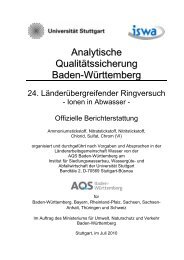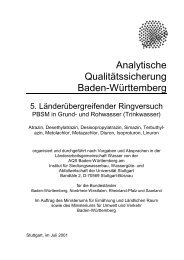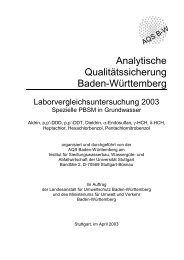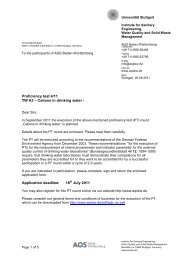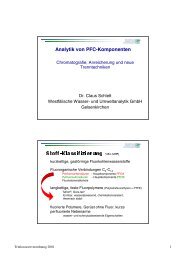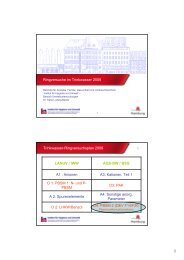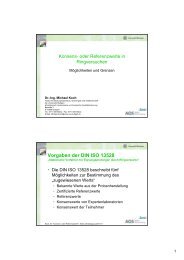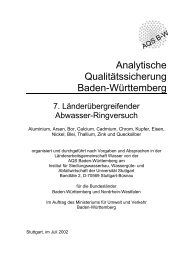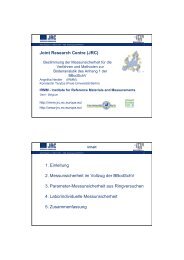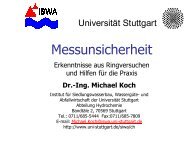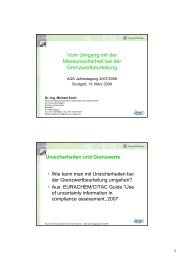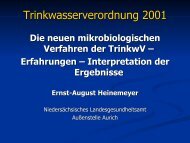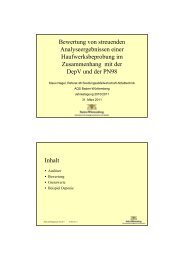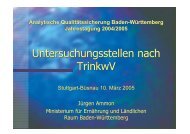Institute for Sanitary Engineering, Water Quality and Solid Waste ...
Institute for Sanitary Engineering, Water Quality and Solid Waste ...
Institute for Sanitary Engineering, Water Quality and Solid Waste ...
Create successful ePaper yourself
Turn your PDF publications into a flip-book with our unique Google optimized e-Paper software.
<strong>Institute</strong> <strong>for</strong> <strong>Sanitary</strong> <strong>Engineering</strong>, <strong>Water</strong> <strong>Quality</strong> <strong>and</strong> <strong>Solid</strong> <strong>Waste</strong> Management<br />
Chair of Hydrochemistry <strong>and</strong> Hydrobiology<br />
At the chair of Hydrochemistry <strong>and</strong> Hydrobiology actual<br />
practice-oriented topics are investigated <strong>and</strong> natural<br />
science based solutions are developed in interdisciplinary<br />
co-operation with engineers. A basic knowledge<br />
in natural sciences is required to underst<strong>and</strong> interdisciplinary<br />
contexts concerning all areas of Environmental<br />
<strong>Engineering</strong>. Biological <strong>and</strong> chemical processes are of<br />
high importance <strong>for</strong> the treatment processes of drinking<br />
water <strong>and</strong> wastewater as well as <strong>for</strong> composting<br />
of solid <strong>and</strong> green waste or <strong>for</strong> the decontamination<br />
of groundwater. The quality of water, no matter if it<br />
is wastewater, surface water, groundwater or drinking<br />
water, is defined by chemical <strong>and</strong> microbiological parameters,<br />
<strong>for</strong> which the legislator has set limits (e.g. in<br />
the Drinking <strong>Water</strong> Ordinance). Since it is not allowed<br />
to exceed these limits, it is important to reiterate the<br />
analytical monitoring process at regular intervals.<br />
The task of the Environmental Analysis is to develop<br />
<strong>and</strong> to apply methods which allow to identify <strong>and</strong><br />
quantify inorganic <strong>and</strong> organic compounds, either as<br />
single substances or in total (as so called summary<br />
parameter) in various environmental compartments,<br />
such as water, waste water, l<strong>and</strong>fill leachate, soil, sediment,<br />
sewage sludge etc. The high toxicity of some<br />
substances <strong>and</strong> the problematic ecotoxicological properties,<br />
e.g. the tendency to undergo geo- or bioaccumulation,<br />
dem<strong>and</strong>s a specific <strong>and</strong> selective determination<br />
of substances in very low concentrations despite<br />
possible interferences with other matrix components.<br />
There<strong>for</strong>e the methods have to be constantly optimised<br />
<strong>and</strong> interpretation of analytical data has always to<br />
consider measurement uncertainty.<br />
New technologies in the wastewater treatment or drinking<br />
water purification are most effectively developed<br />
by a close co-operation at the interface between the<br />
<strong>Engineering</strong> <strong>and</strong> Natural Sciences, e.g. the determination<br />
of the efficiency of a water purification method.<br />
Effect-related analysis, in which the concentrations of<br />
a pollutant in a sample are correlated with its biological<br />
effects as basis <strong>for</strong> a risk-assessment is one of the<br />
numerous interdisciplinary networking areas of biology<br />
<strong>and</strong> chemistry.<br />
The Chair <strong>for</strong> Hydrochemistry <strong>and</strong> Hydrobiology at the<br />
ISWA has been supervised by Prof. Dr. rer. nat Jörg<br />
W. Metzger since 1996, being also the Head of the<br />
Department of Hydrochemistry. The division of Applied<br />
Biology is managed by Dr. rer. nat. Bertram Kuch.<br />
Teaching Activities<br />
The Department of Hydrochemistry offers a broad range<br />
of basic <strong>and</strong> advanced courses <strong>for</strong> the students of<br />
the Bachelor <strong>and</strong> Master programs Civil <strong>Engineering</strong><br />
<strong>and</strong> Environmental <strong>Engineering</strong> <strong>and</strong> the master programs<br />
WAREM <strong>and</strong> WASTE at the Universität Stuttgart.<br />
The lectures cover all important topics of Chemistry<br />
of <strong>Water</strong> <strong>and</strong> <strong>Waste</strong> <strong>Water</strong>, <strong>Water</strong>- <strong>and</strong> Soil Protection<br />
<strong>and</strong> Environmental Analysis. A deeper insight to these<br />
issues is given by practical courses, e.g. <strong>for</strong> sampling<br />
or chemical analysis in the chemical <strong>and</strong> microbiological<br />
laboratories of the department.<br />
Courses <strong>for</strong> Environmental <strong>Engineering</strong><br />
• Umweltchemie mit Praktikum; Environmental<br />
Chemistry (lecture <strong>and</strong> practical laboratory work)<br />
• Umweltanalytik II mit Praktikum; Environmental<br />
Analysis (lecture <strong>and</strong> practical laboratory work)<br />
• Chemische Grundlagen des Gewässerschutzes;<br />
Chemical Basis <strong>for</strong> <strong>Water</strong> Resource Protection<br />
• Ökotoxikologie und Bewertung von Schadstoffen;<br />
Ecotoxicology <strong>and</strong> Risk Assessment of Pollutants<br />
• Wasser- und Abwasserchemie mit Praktikum;<br />
Chemistry of <strong>Water</strong> <strong>and</strong> <strong>Waste</strong> <strong>Water</strong> (lecture <strong>and</strong><br />
practical laboratory work)<br />
• Praktikum chemische Wassertechnologie; Chemical<br />
<strong>Water</strong> Technology (practical laboratory work)<br />
• Qualitätssicherung in der chemischen Analytik;<br />
<strong>Quality</strong> Assurance in Chemical Analysis<br />
• Messen und Analysieren von Gewässerverunreinigungen<br />
mit Praktikum; Measurement <strong>and</strong> Analysis<br />
of <strong>Water</strong> Pollution (lecture <strong>and</strong> practical laboratory<br />
work)<br />
• Schadstoffanalytik mit Praktikum; Analysis of Pollutants<br />
(lecture <strong>and</strong> practical laboratory work)<br />
Suitable biological test systems (bioassays), preferably<br />
as simply as possible, represent the basis <strong>for</strong> the<br />
practicable application of this concept. Also <strong>for</strong>mation<br />
of the investigation of the environmental behaviour of<br />
native <strong>and</strong> anthropogenic substances, e.g. degradation<br />
pathways <strong>and</strong> metabolites as well as the identification<br />
of microorganisms participating in the degradation<br />
reaction, requires that chemists <strong>and</strong> biologists<br />
work h<strong>and</strong> in h<strong>and</strong>.<br />
Courses <strong>for</strong> Civil <strong>Engineering</strong><br />
• Chemie für Bauingenieure; Chemistry <strong>for</strong> Civil Engineers<br />
• Wasser- und Abwasserchemie; Chemistry of <strong>Water</strong><br />
<strong>and</strong> <strong>Waste</strong> <strong>Water</strong><br />
• Biologie und Chemie von Wasser und Abwasser<br />
mit Praktikum; Biology <strong>and</strong> Chemistry of <strong>Water</strong><br />
<strong>and</strong> <strong>Waste</strong> <strong>Water</strong> (lecture <strong>and</strong> practical laboratory<br />
work)<br />
118



